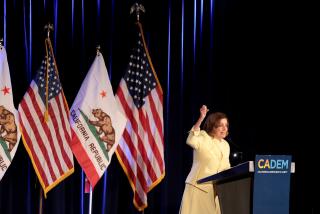Sen.-Elect Clinton Vows to Cooperate With GOP
- Share via
NEW YORK — Senator-elect Hillary Rodham Clinton, a tough partisan fighter for her husband and her health care plan, pledged Wednesday to work in a collegial manner with Republicans on issues from health care to economic development.
From the opening minutes of her first news conference the day after winning the U.S. Senate seat from New York, Clinton made clear she wants to craft a new image to work effectively with the 99 other strong egos in the Senate.
“I see this as a real opportunity to work in a bipartisan way with people who are interested in many of the same concerns that I have had for a lifetime,” she said, noting that Sen. Orrin G. Hatch (R-Utah), one of the Senate’s most conservative members, had called to congratulate her.
With the Senate so closely divided, she emphasized, only a cooperative effort across party lines can produce results. “I think there’s a lot of room for working together.”
While Clinton tried to focus on her prospective work as senator, the reality of her historic position--the first first lady ever elected to public office--kept intruding into the crowded conference room at the Grand Hyatt hotel, her election headquarters.
There were 26 television cameras and several dozen reporters and photographers on hand to record every word of the fledgling senator.
Following the protocol of a presidential event, the Secret Service cleared the room in advance of the news conference, checking cameras and other equipment, and then scrutinized each participant with hand-held screening equipment. A White House photographer was on hand to record the scene for the presidential archives.
And very few other just-elected senators would be asked at a standing-room-only news conference: “Are you running for president?”
“No, I’m going to serve my six years as a junior senator from New York,” Clinton answered.
Asked how Clinton’s election will affect the dynamics of the Senate, Sen. Mitch McConnell (R-Ky.), chairman of the National Republican Senatorial Committee, said: “It won’t alter a thing. The Senate’s a great leveler. When you come into the Senate, no matter how famous you may have been before you got there, you’ve got one vote, and you get on the seniority ladder at the bottom.”
Clinton said her first bill will deal with promoting economic development in poor areas of upstate New York that haven’t benefited from the current prosperity. The measure would include tax credits for businesses hiring workers in areas of high unemployment. She also said she is anxious to work with Hatch and other members of the Republican majority, as well as fellow Democrats, in expanding health coverage for the uninsured.
“I think I will get a very positive reception,” Clinton said. “I have worked with a number of Republican members in the past.”
But cooperation has its limits. Clinton said there are issues, particularly those involving women, who gave her 61% of their votes, on which she will not compromise. She cited “gun safety measures and a woman’s right to choose.”
Their electoral backing “was a very powerful statement of what women voters care about, which is what I care about,” she said.
Like few other people in politics, Sen.-elect Clinton has the ability to draw attention to an issue. She also can spark intense partisan feelings.
Joining the Senate is “like any new job: You’ve got to be willing to work hard, to learn the ropes and the rules.”
But her role, at least for the rest of the Clinton administration, is unique. For example, she attends tonight’s White House dinner with her husband and former Presidents Bush, Carter and Ford to celebrate the 200th anniversary of the White House. Next week she accompanies her husband to Vietnam, possibly her last foreign trip as first lady.
*
Times staff writer Richard Simon contributed to this story.
More to Read
Get the L.A. Times Politics newsletter
Deeply reported insights into legislation, politics and policy from Sacramento, Washington and beyond. In your inbox twice per week.
You may occasionally receive promotional content from the Los Angeles Times.









